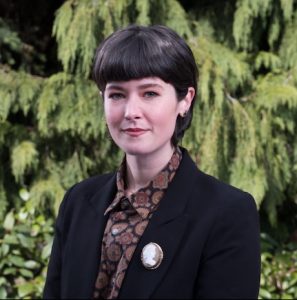Hailey Walley – Alumna Spotlight
Law School Student, Lewis & Clark Law School
Hometown: Bay Saint Louis, MS
BA in Anthropology and Philosophy, minors in Environmental Studies & Italian (2019)
LinkedIn Profile
Why did you decide to study your combination of majors and minors at UM?
Well, as a graduate of Mississippi School for Math and Science, I actually came to UM with plans to pursue a degree in biochemistry so that I could attend pharmacy school and eventually open a homeopathic apothecary. Luckily, however, UM’s liberal arts program required that I also take a number of humanities and social science classes for which I will forever be grateful; I guess you could say that within the humanities I felt like I had finally found my home. It took only a semester for me to change my major to anthropology and then one more till I added philosophy as a second major and Italian as a minor. Anthropology especially was like being introduced to a whole new perspective of the world—as if the blinders were stripped from my vision and I finally saw the world in all its wretched beauty. I most definitely regard my studies in anthropology as having shaped my current worldview. I think it made me a much more empathetic and holistic thinker which has proven immensely advantageous in both my personal life and career.
What were some significant experiences or fond memories of your time at UM?
I can easily say that my fondest memories of my time at UM revolve around the opportunities I had to study abroad. My first trip was to Salerno, Italy, in 2016 for a language immersion program that in many ways also doubled as my first ethnographic excursion as I began to explore this new analytical perspective that anthropology had provided me. I later traveled to La Paz, Bolivia, in 2017 for an intensive ethnographic field research course that I can say was hands down one of the best trips I have ever taken in my life — we did everything from trekking through the Amazon Rainforest to meeting with top Bolivian government officials and United Nations representatives. No matter how far removed in time this chapter of my life becomes I will never be able to escape its immense influence on my person; it was these experiences that kindled within me a passion for environmental protection which has since led me to where I am today in pursuing an environmental law degree.
Please describe your educational/career path since graduation from UM.
Following my graduation from UM in 2019, I decided to take a gap year prior to attending law school. I had saved most of my campus-job earnings for about a year and then self-organized a 7-month solo volunteer trip through WWOOF to Ireland, Croatia, Morocco, and Thailand where I stayed with local families in exchange for my assistance on their organic farms. Upon returning to the States I made the decision to attend Lewis & Clark Law School in Portland, OR, where I remain today as I prepare to enter my third and final year. As of now my general post-grad plan is to return to the South to work on environmental justice and restoration initiatives via employment by a nonprofit or other public interest entity. Some of the issues I wish to address throughout my career include: the water crisis in Jackson, MS, the Gulf Coast’s Dead Zone as caused by upriver pollution, and the expansive food deserts across our state.
What is the value of studying modern languages in today’s world?
It cannot be overstated enough, I think, as to how invaluable it is to study other languages and to experience other cultures. I can honestly say that I wouldn’t be who or where I am today had I not discovered anthropology, philosophy, and Italian. And to be clear, it’s not as if I have ceased to be interested in STEM-related topics; rather I find that my interdisciplinary background has actually bolstered my understanding of many such concepts due to the more holistic perspective from which I now contemplate them. Humanity is the source and common denominator of all disciplines of thought; once one recognizes this it becomes impossible to overlook the interconnectivity of our world’s problems—as well as the solutions thereto. To understand the language and culture from which a topic stems is to comprehend the ways in which it is thus shaped and also limited by these artificial creations.

